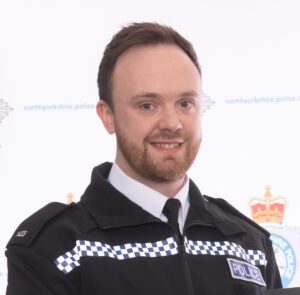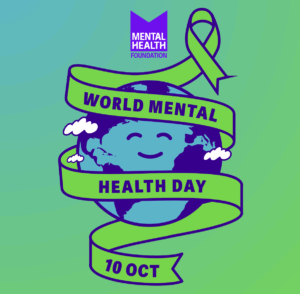Friday 10 October
A police officer is speaking out on the importance of seeking mental health support – after witnessing a tragic incident which took a heavy toll on his wellbeing.

Mark Foster’s life spiralled into a dark place marked by sleepless nights, anxiety and a deep sense of isolation after being called to a crime scene last year.
He eventually sought support from a specialist service run by our trust – which helped him overcome the “black void” blighting his life.
“As frontline responders we go to places, and attend incidents, where we may see the worst events that can happen to anyone,” said Mark, from North Yorkshire.
“We carry those burdens throughout our shifts and in our careers. This unfortunately can find itself impacting on our own personal lives, in how we think and feel.
“I would urge people to seek support and talk to someone, if they feel their work is affecting them. Getting the right support can really change your life.”
Difficult dark days
Mark, 33, had attended dozens of incidents during his police career before responding to the call which was to haunt his dreams.
In the months after the incident, he started to feel “increasingly numb and restless”. He also had recurring thoughts of the traumatic witness account he had heard.
Eventually, Mark found himself “isolating from everybody” – pulling away from his friends and family, while dwelling of the details of the incident.
“I felt myself slipping away,” he said. “I took no enjoyment in activities or interests, and developed severe anxiety to the point where I couldn’t socialise.
“Despite taking time off work, I still found myself thinking of that night. I found myself not wanting to be around on this world anymore, I needed an escape from it all.”
Seeking support for brighter future
Mark was in a dark place by the time he reached out to his GP for help, and was referred to both his local mental health team and North Yorkshire NHS Talking Therapies.
His treatment included taking part in trauma-focussed cognitive behavioural therapy, which allowed him to process key parts of the memories he was struggling with.
“At first I found the sessions very tiring and emotional, bringing back unwanted memories and feelings I experienced during the incident,” said Mark.
“It was tough to revisit that night, but it freed me from the weight I was carrying. For the first time, I had a safe space to express my feelings without fear of judgment.”
Mark’s experience is not uncommon among first responders nationally, who regularly confront harrowing situations in their day-to-day frontline roles.
According to the National Police Federation, almost 18,000 police officers were signed off for mental health reasons in the financial year of 2024-25.
“No uniform will ever truly protect you from the mental traumas out there with our line of work. We are humans too – and it’s OK not to be OK,” said Mark.
Journey back to health

Mark, a police constable, had two clear goals during therapy: to reclaim his sense of self and to prepare himself for the possibility of testifying in court.
Although the journey back to health was tough – including revisiting trauma sites and reviewing sensitive materials – he faced the challenge head-on.
“I can’t recommend Talking Therapies enough. The support I received was crucial in bringing me back from a place of darkness,” said Mark.
“Working in frontline responding – no matter what emergency service you work in – can be incredibly hard and challenging at times.
“Talking about what happened is the first step to recovery. By speaking out, I hope I can encourage other first responders to seek the support they need.”
The right support at the right time
Helen Dodd, an associate practitioner at North Yorkshire Talking Therapies, said: “Mark’s experience demonstrates the vital importance of frontline workers being able to access the right support at the right time.
“I am so pleased that Mark worked with us to help him overcome an extremely difficult time and, as his life moves forward, he is benefitting from the positive impact that therapy has had.
“Our service supported Mark in moving forward in his life and can do the same for many others.”
- It’s important to get help early if you’re struggling with your mental health. There’s a range of easily accessible support available including self-help guides, Recovery College Online, mental health support in GP surgeries and Talking Therapies. Find out more on our You Matter homepage.